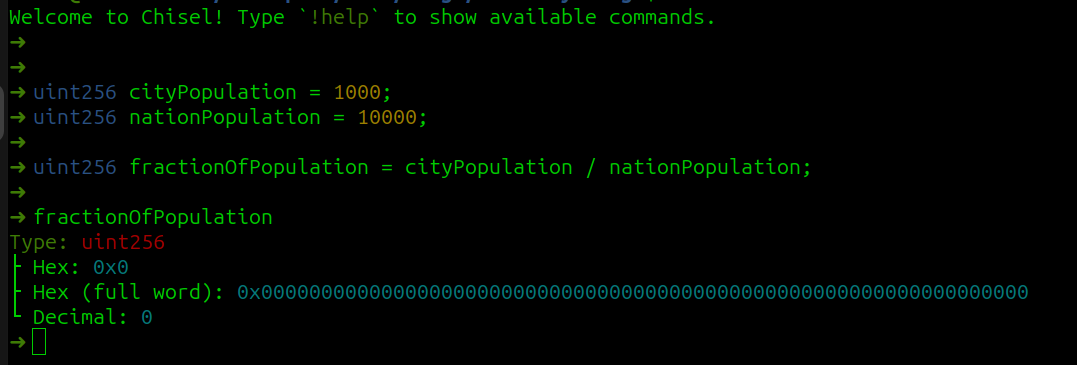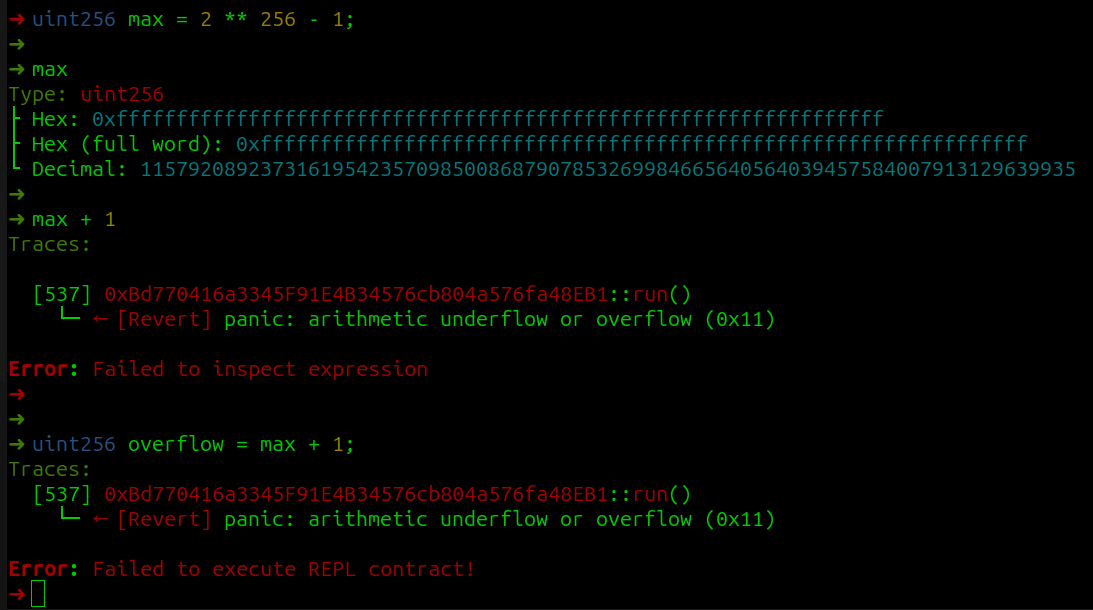Solidity Notes
Notes on solidity and blockchain. This notes will InshaAllah be continuously updated. Most of the notes are from the following sites so you can visit them for more:
Division in Solidity
- When division involves fractions then the numerator and denominator need to be multiplied a factor because solidity does not have floats.
/// for example you need 7.5% of 200 then you can't do this
uint 256 result = 200 * 7.5 / 100 // this won't work
/// instead you multiply by a factor of 10
uint 256 result = 200 * 75 / 1000
- When dividing 2 numbers and the numerator is greater than the denominator then the result will be 0.
uint256 cityPopulation = 1000;
uint256 nationPopulation = 10000;
uint256 fractionOfPopulation = cityPopulation / nationPopulation;
//fractionOfPopulation is zero!
Below is a result from chisel, a commandline tool part of the foundry toolchain that provides a repl for solidity:

This is because solidity does not allow floats as floats are not deterministic, and the blockchain needs to be deterministic.
Overflow and Underflow
Prior to solidity version 0.8 overflow and underflow were not checked by default. This means that if you add 1 to the maximum value of a uint256, the value will wrap around to 0. This can be a security risk if not properly handled.
uint256 max = 2**256 - 1;
uint256 overflow = max + 1;
// overflow is 0
starting from solidity version 0.8, overflow and underflow are checked by default. This means that if you add 1 to the maximum value of a uint256, the transaction will revert.

Arrays and Strings
The function argument for arrays and strings is calldata and the function argument for the return type is memory. The calldata “refer to the data in the ethereum transaction itself”. memory is similar to heap in other languages like C++.
// SPDX-License-Identifier: MIT
pragma solidity ^0.8.0;
contract ExampleContract {
function booleanArrayExample(bool[] calldata input) public pure returns (bool[] memory) {
return input;
}
function addressArrayExample(address[] calldata input) public pure returns (address[] memory) {
return input;
}
}
- Trying to access the value of an empty array will revert
uint256[] memory numbers;
// add item to the array
numbers.push(10);
uint256 number = numbers[0]; // this will revert
- Passing more element than the array can hold will revert for a fixed-size array
uint256[3] memory numbers;
numbers[3] = 10; // this will revert
- String concatenation support was added in ^0.8.12
pragma solidity ^0.8.12;
contract ExampleContract {
function useArrays(string calldata user)
public
pure
returns(string memory) {
return string.concat("hello ", user);
}
}
- Uninitialized values can have unintended consequences if not carefully put into consideration
// notice that `uint256 i` is not initialized, so it's value is 0
function filterOdd(uint256[] memory _arr) public view returns (uint256[] memory){
uint256[] memory evenNumbers = new uint256[](_arr.length);
uint256 count = 0;
for (uint256 i; i < _arr.length; i++){
if (_arr[i] % 2 == 0){
evenNumbers[count] = _arr[i];
count += 1;
}
}
return evenNumbers;
}
// correct implementation should be
function filterOdd(uint256[] memory _arr) public view returns (uint256[] memory){
uint256[] memory evenNumbers = new uint256[](_arr.length);
uint256 count = 0;
for (uint256 i = 1; i < _arr.length; i++){
if (_arr[i] % 2 == 0){
evenNumbers[count] = _arr[i];
count += 1;
}
}
return evenNumbers;
}
Storage
- A storage variable with
internalmodifier is not visible to other contracts but is still stored on the blockchain and visible to anyone who reads the blockchain.
contract ExampleContract {
uint256 internal secretNumber = 42;
}
- Accessing a mapping with a key that does not exist will return the default value of the data type
mapping(address => uint256) public balances;
function getBalance(address _address) public view returns (uint256){
return balances[_address];
}
// if the address does not exist in the mapping, the function will return 0
- Mapping can only be declared as storage, you cannot declare them in a function
// this will not work
function getBalance(address _address) public view returns (uint256){
mapping(address => uint256) storage balances;
return balances[_address];
}